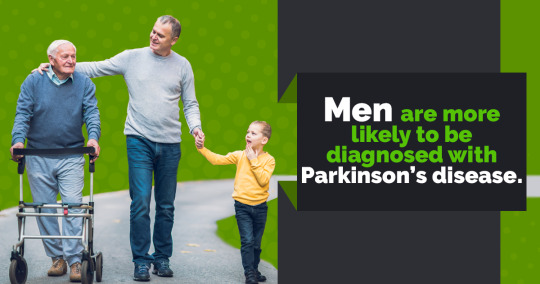Parkinson’s disease (PD) is a disorder of the nervous system that progressively affects movement. PD occurs in 50% more men than women, but that’s not the only variance. Gender differences in Parkinson’s disease also affect onset age, symptoms, treatment, and more.
2 to 1

Researchers don’t know why men are affected twice as likely with Parkinson’s disease than women. Early clinical study results indicate estrogen may protect women in the sense they have more dopamine available in key areas of the brain. Also, men have a higher rate of minor head trauma and exposure to toxins, but these theories need more investigation.
Onset and Symptoms of PD
Women tend to develop PD around 2.1 years later than men. In general, men and women experience the same motor and non-motor symptoms, but there are variances in which sex encounters more difficulty while diagnosed with PD. Some examples are:
- Men physically act out more while dreaming than women.
- Women experienced more tremor symptoms, and men had more rigidity issues.
- Women develop motor symptoms later than men, so they score better at motor abilities.
- Postural instability and lack of spatial awareness make women more susceptible to falls than men.
- Men develop freezing of their walking gait much later than women.
- Weight gain, fatigue, depression, restless legs, constipation are more common and more severe in women.
PD Treatment Effects by Gender
Levodopa is the standard medication to treat PD. Women metabolize it differently than men, so the dosage for men with PD is higher than for women. Their larger body mass could explain the higher dosage for men. Men also reported fewer side effects with levodopa, known as levodopa-induced dyskinesia (involuntary movements). Also, women receive surgical interventions less often than men do, and their symptoms are more severe by the time they get to that point. To add, the improvements gained from surgery may not be as significant for women.

Thanks to clinical research studies, more information about Parkinson’s disease is being discovered, such as the differences in disease progression in men and women. Undoubtedly, more work must be done so better ways to detect and manage it can be found for those diagnosed. To learn more about upcoming studies for Parkinson’s disease here at Neuropsychiatric Research Center of Southwest Florida, call (239) 939-7777 or visit our website.
References:
https://www.mayoclinic.org/diseases-conditions/parkinsons-disease/symptoms-causes/syc-20376055
https://www.healthline.com/health/parkinsons-symptoms-men-women#coping-with-pd





